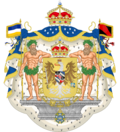Occidian Empire
Occidian Empire | |
|---|---|
| Motto: "Indivisibiliter ac Inseparabiliter" | |
| Anthem: "Im Land der Dunklen Wälder" | |
 Map of the Occidian Sphere of Influence | |
| Capital | Greenedge (administrative capital) Persenburg (imperial court) |
| Official languages | English |
| Demonym(s) | Occidian (official) North American, New European (unofficial) |
| Government | Confederated Constitutional Monarchy in Personal Union |
• Emperor | Oscar I |
• King in the Empire | King Joseph |
| Legislature | Council of Junkers |
| Formation | |
• Unification of the Confederation | 28 November 2010 |
• Unification Agreement | 13 July 2015 |
• Admission into the Grand Republic of Delvera | 12 March 2018 |
• Oscarine Constitution | 01 October 2020 |
• Merged to Karnia-Ruthenia | 15 December 2021 |
| Population | |
• 2021 census | 28 |
| Currency | Curo (₡) |
| Time zone | UTC−3 (BRT (capital)) |
• Summer (DST) | UTC-2 (BRST (capital)) |
| Date format | dd/mm/yyyy |
| Driving side | right |
| |
Occidia, officially Occidian Empire and also known by other names, is a constitutional monarchy largely based on the culture of the United States and German Empire and is located in America. It was created as a reformation of the North American Confederation in a personal union with Karnia-Ruthenia, as a result of the Act of Abdication and Viceroyalty[1] and subsequent fourth constitution its history, named Oscarine Constitution.
Formed from some of the oldest and most highly regarded micronations in North America, Occidia is a confederation of families and households, led by a Constitutional Monarchy. The administrative capital is Greenedge, while the imperial capital is Persenburg. The recognized territories of the Confederation were designated as the collective lands owned and controlled by the citizens of the nation. A province of the Grand Republic of Delvera since 28 July 2018 and a constituent state of Karnia-Ruthenia since 15 December 2021, the nation was surrounded on all sides by the United States of America.
Structure and name
The monarch of the House of Götzö-Thomaz-Rocha rules as Occidian Emperor. The micronation bore the official name of Occidian Empire, but it is often contracted to “Occidian” or simply referred to as “the Empire”. The names “Imperial State of Occidia”, “Occidian State”, “Occidian Empire” and “Occidia” are equal by constitutional determination.
The Empire is a confederated state, which guarantees a degree of autonomy for its administrative regions. The Council of Junkers is located in Imperial Residence, the administrative capital; the seat of the Imperial Court is in Persenburg. The Empire uses the U.S. Dollar as a macronational currency, but also have an official micronational currency, the Curo.
The term "Occidian", in the terms of its Constitution, is tge representative of the people’s collective shared heritage and presence upon the same continent, and representative of where we shall exercise the majority of our regional power. The people of Occidia is referred to as "Occidians" in reference to the ancestral region of Occidia, formerly a region of the Empire of New Europe, and their unique identity as an Empire on the Western Hemisphere.
History
The Founding of the North American Confederation
The North American Confederation was initially formed from the micronations of the Empire of New Europe, the Ohio Empire, and the Democratic People's Republic of Eniarku. At the time of the NAC's founding, micronationalism on the American continent had fallen on hard times and it was hoped that the NAC might help to inspire and revitalize the North American micronational community.

Negotiations began on 31 October 2010 when the government of the Ohio Empire, under Emperor Malum I, requested to merge the Ohio Empire into the Empire of New Europe as a new state. Intrigued by the idea, the New European government contacted the Democratic People's Republic of Eniarku, an old ally nation located in Michigan, and proposed that all three nations unite into a single nation under mutual terms. At first negotiations went well with the demands of each micronation made known within roughly a week. But progress was slowed by the day-to-day activities of the New European Emperor, Wilhelm I, who had been selected to host the negotiations. With Wilhelm being an active soldier in the United States military, it became difficult for him to host an online meeting with the prospective member states. As events in the community continued on, interest in unification seemed to wane.
Suddenly, on 28 November, Wilhelm gave all prospective states provisional terms for a potential merger of their nations. The terms laid down only the foundation for the first government and constitution of the North American Confederation, simply abolished each micronations political parties, and collectively placing all military and foreign policy in the hands of the newly declared confederate government. After some debate, the leaders of all three founding states soon agreed to the terms laid out and the first North American micronational union was officially founded. But the road ahead would be incredibly difficult. Beyond establishing basic governmental functions and constitutional laws, any relations with other micronations held by the now constiuent states of the Confederation had to be placed under review to see if the new government wished to continue them.
Upon unification, it was agreed that though the NAC would be fundementally democratic, it would also have a constitutional monarchy, though the first government had yet to decide if it would be hereditary or elected. But they all agreed on crowning Wilhelm as Emperor William I of North America. The leader of Eniarku, the People's President Aaron Meek, would be appointed the Confederation's first Prime Minister, and Malum I, now known by his pre-regnal name, Joseph Marx, became the first Foreign Minister.
Troubled Times

At first, the new nation appeared to thrive under its new arrangement. However many of the problems that each constituent nation had possessed before unification still plagued the Confederation's early politics. Plans for an election to properly elect leaders failed when it became clear that there was simply not enough activity to do so. Ohio's issue with citizen activism and numerous territorial claimants persisted, while the ideological struggles between the monarchist and residual fascist factions within New Europe aided in giving the confederation a very poor initial reputation within the community. This reputation was only hardened by initial diplomatic isolation.
And perhaps worst of all, no constitution could be agreed upon. Though the constituent states had all agreed to be unified under a single government, they collectively represented many politically diverse factions and many of the defunct parties reformed under the NAC, with embittered political debates and feuds arising in the early NAC legislature. All these factors spelled disaster for a micronation barely in its infancy. Reluctantly, Emperor William was forced to declare a national emergency, taking absolute control of affairs. He cancelled the failed attempts at elections and declared that the only active citizens would be those already in power in and outside the states. All claimed populations were to be considered invalid until they registered on the nations website. He then demanded a full constitution be written by the 14 January 2011 or he would write it himself.
He then began inviting other micronations to join NAMCO, an early military and cultural organization that had been founded in 2009, though these efforts found little success. Finally, the Emperor introduced the Amero as the Confederation's official currency. It was designed after the U.S. dollar but based off the Euro in function. He also began having conversations with foreign diplomats about expanding realistic micronational trade.
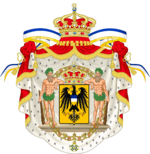
It was while attempting to expand relations with Bethania that the confederation experienced its first major diplomatic incident. On 9 January 2011, Bethania suddenly cut ties with the Confederation. The Bethanian government stated that they had been informed by an ally that the Confederation had been "conveniently" omitting the influences of Nazi and White supremacist ideologies on Confederation's policies, an issue which had been left over from the Empire of New Europe's residual fascist faction. If the NAC wished for negotiations to continue, the Emperor would need to show that Nazism has no influence on the Confederation in any capacity.
It was later found that Starland had been responsible for spreading rumors about the Confederation's supposed Nazi influences, and the community's history regarding New Europe. This caused a huge outrage from the Confederation government, with some even calling for war against Starland. While third-party arbitration prevented such a possibility and even improved things on both sides, the proposal of blacklisting Starland was seriously considered, though a last minute request for a chance to improve relations was eventually granted.
Following the dissolution of the Slinky Empyre in January 2011, Duke Dakoda of Georgeton contacted the Confederation and requested that his nation be admitted as the NAC's fourth state, which was quickly approved. Still without a standing constitution at the time of Georgeton's admission, the new state was only required to surrender its foreign affairs and incorporate its local military into the larger North American Army chain of command. Granted employment into the Ministry of Foreign Affairs, Dakoda became the confederations ambassador to the Slinky Republyc, after requesting the government support it. However when the Slinky War broke out on the 22 January, Georgeton independently declared war on the nation of Istoria, potentially plunging the entire NAC into an unwanted political conflict.
The government had decided to pursue a state of neutrality in the conflict, even refusing to engage in an alliance with Richland just as the war seemed to be brewing. However with Georgeton involvement, it brought into serious question the government's ability to exert control over its own territory and citizens. The government issued numerous demands for Georgeton to surrender its military control to the government and cease all hostile actions. In the end, the Emperor issued an ultimatum that either Georgeton end its military activities or be expelled from the Confederation all together. Georgeton continued to act independently, cutting communications with the government entirely. Soon after, on 30 January 2011, they formed the United Kingdom of New Britain and Georgeton, a short-lived micronation.
This act was taken as such an insult that the government declared Georgeton expelled from the Confederation and it was blacklisted from joining it again, resulting in threats of war among many other threats from Duke Dakoda which, after seeking advice from other nations, were promptly ignored and the situation simply faded.
Not all of the actions during the Meek government were struggle and controversy, however; as around the same time, the government's temporary territory in Georgia had begun to experience a rise in citizenship. The Emperor gained support from his co-workers Jacob Ramirez, who brought along his own means of media presentation. And a man named Juan Carlos, who's high regard for tradition and skills made him the ideal candidate for the position of Minister of War. The government also began expanding relations with Ultamiya, that would ultimately help to mediate a growing "Cold War" between them and Richland, as well as the Pimpland War. The Confederation also began a diplomatic push to encourage participation in the Micronational War on Terror.
Crisis and Interregnum
Although the Confederation had managed to overcome every political incident and struggle that came it's way, beneath the surface lied a systemic fatal flaw. Almost from it's founding, there had been a power struggle over who should truly rule the Confederation, the Emperor or the Prime Minister. Behind each was the support of two prominent respective factions, the Conservatives (led by many New European micronationalists) and the Commu-Socialists (led by several prominent Eniarkuans), with the Libertines (a third moderate party composed of Ohioans) acting as a mediator between the two camps. So long as there was an equal balance between the three factions, peace seemed relatively secure and almost all controversies and political infighting could be mitigated.
That balance came to an end in March 2011, when a meeting of citizens from the Temporary Territory of Georgia, predominantly a Conservative region, declared that they would rather be part of Micras instead of the MicroWiki community. This declaration and the subsequent incident, which quickly became known as the Micras Crisis, gained a great deal of groundswell and negative opinions, before finally being put to a vote before Congress. As the Commu-Socialists and the Libertines happened to agree on the issue, the vote was defeated by 2 in favor of remaining in the MicroWiki. However the citizens of Illinois, Connecticut and the Temporary Territory of Georgia held statewide referendums that called for a move to Micras with or without the government. The day following the Congressional vote, the Emperor issued statements to both the public and to the government, indicating a consideration towards abdication and his support for a move to Micras, effectively galvanizing the Conservatives behind the move.

The possibility of the Emperor's abdication was met with open-mindedness from the Prime Minister, with Meek's only concern being the belief that the Emperor had no right to take parts of the Confederation with him. An hour later, Emperor William released a statement of abdication in which he vested all his powers as Head of State to Prime Minister Meek, effectively destroying the monarchy as a political power in the North American Confederation, but also developing a crisis for the future.
For its remaining two weeks of life the confederation was a hollowed out nation between Eniarku and Ohio, as the Commu-Socialists took almost complete control of the government. An effort was made by Libertines, who did not believe that Emperor William could simply end the monarchy declared that the Emperor's brother, Jonathan, legally assumed the throne, though Jonathan never officially claimed the title nor such a claim recognized by the now Commu-Socialist NAC Congress. Though the two remaining states did what they could to keep the Confederation, with efforts made to transition it into a republic, all efforts eventually failed. In the end, Prime Minister Meek declared the Confederation dissolved and all political posts abolished. For two of the three founding states it was simply another chapter in their histories. New Europe and Eniarku continued as they had, but for the newly republican Ohio, whose efforts to reform their government had been thrown into chaos by the Micras crisis, it was the end of any organized government and the former Emperor went into quiet retirement. The Interregnum, as it would come to be known, had begun.
Reconstruction and Late Wilhelmine Era

In April 2014, Johannus von Ikner, a New European politician, claimed that William's abdication was illegal, citing that it was not approved by Congress. Former Prime Minister Meek could not find documentation to counter this claim. After a short discussion between the former leadership it was agreed to restore the union in its November 2011 form pending a revision of the constitution. This however failed and the Confederation was left defunct for another year. Finally in May 2015, Emperor William I contacted the former Emperor of Ohio, Joseph Marx, and the two made an agreement to reconstruct the North American Confederation. Joseph Marx became the new Prime Minister of a provisional government until the Constitution could be written. This time, however, the specific qualifications to call a convention were laid down and immediately agreed.
On 13 July 2015, the Emperor and the Prime Minister passed the Unification Agreement of 2015. This law outlined the relationship between the Emperor of Ohio, a title held in pretense by Prime Minister Marx and the House of Hartmann-Peters, the ruling house of North America. In the agreement, Marx agreed to name Crown Prince William as heir to the position of Emperor of Ohio, on the condition that upon the former's abdication, the title would be changed to Prince of Ohio and made the possession of the Crown Prince of North America. This was then followed up by Marx's announcement of abdication from the throne of Ohio.[2]
On 26 October, Prime Minister Marx completed several weeks of negotiations with Consul Jordan Brizendine of the Grand Republic of Delvera in regards to the territorial dispute between the two nations which recently began diplomatic relations. The agreement, called the Missouri Compact, places restrictions on the extension of land claims that either nation can perform and saved the neutrality and significance of the ancestral Kingdom of Callaway, considered of great cultural significance by the Delveran people.[3]
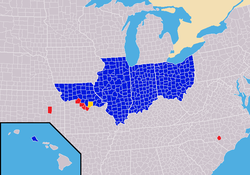
On 10 May 2016, the Office of the Prime Minister announced the Acrin Admission Act, which formally admited the Kingdom of Acrin into the North American Confederation with full statehood status.[4] This agreement with the Karno-Ruthenian Empire came after months of diplomatic talks and negotiations between the Prime Minister Marx and Oscar of Karnia-Ruthenia. The act designated that Acrin would enjoy all the privileges of statehood, including representation in the soon to be established national legislature; as well as continue to exist as a kingdom within the Karno-Ruthenian Empire. Oscar I would continue to rule as King of Acrin, with the assistance of High Commissioner Christian von Letzembourg. Despite the optimism after the ratification of the treaty right after the Missouri Compact, Acrin would leave the Confederation few months after.
On 26 June 2018, the Emperor and Prime Minister finalized and ratified a second Constitution for the North American Confederation. This document was the culmination of three years of provisional government under Joseph Marx and marked the first serious step towards ending the Confederation's provisionalism, right as efforts to integrate the Confederation into the Grand Republic of Delvera as a province. The Constitution was formally written by Prime Minister Marx, with assistance from Emperor William, Deputy Prime Minister McCollum and Consul Dylan Callahan of the Grand Republic of Delvera. It was a hybrid of the previous drafts which were voted on by citizens between October 2017 and May 2018.[5] Two days later, Prime Minister, on behalf of and with the consent of the Emperor and the citizens, delivered a sign letter of intent to Consul Dylan Callahan of the Grand Republic of Delvera, with a petition to the Delveran government to consider granting the North American Confederation provincial status within the Grand Republic.[6]
A month later, on 28 July 2018, the Delveran Integration Amendment[7] was unanimously ratified by the households of the Confederation. The Amendment, which passed the Senate in a session on 26 July, was ratified by the five households necessary for the Amendment to now become a part of the Constitution of the North American Confederation. The Amendment altered some of the powers and wording of the Constitution to ensure that the Constitution does not contradict or interfere with the Delveran Constitution or Writ of Rights and also granted the Emperor the power to issue Royal Charters, a power to help foster economic investment throughout the Confederation and strengthen the royal image. This ratification came on the heel of a vote in the Delveran legislature later that evening to decide the fate of the North American Confederation within the Grand Republic of Delvera. That same day, the North American Confederation joined Delvera as its province.[8]
The unification of these two nations first began roughly a year ago, following the Congress of Colo and the alignment of the two nations economic and foreign affairs goals.[9] From its union with Delvera until 2020, several advances were noted, especially through its legislature. The "Senate Protocols Act", the "Legislative Organization and Archival Act", the "Cabinet Reform Act", the "Criminal Code of the North American Confederation",[10] the "Immigration and Naturalization Act", the "National Tourist Retailer Regulatory Bill"[11] and the "National Honors and Peerage Act"[12] and other legislation are all from this period.
On Christmas Day of 2019, in a mutual agreement between Emperor William I and the Prime Minister, the third Constitution, referred to as the "Christmas Constitution" went into effect. With the ratification of the third constitution, the powers and position of the Prime Minister have ceased and been replaced with the Twin Crowns. The new Constitution transformed the Confederation into a Constitutional Diarchy, with the political powers vested into two "Kings in the Confederation". The Emperor retained all of his Imperial titles and was vested with the powers and authority of the Senior Crown, while Joseph Marx, who ceased his Prime Minister position, has been crowned as His Royal Majesty, Joseph I, King in the Confederation. The new Constitution also abolished the Senate as a legislative power and in its place created a similar body comprised of Junkers (North American homeowners and family leaders) called the Council of Junkers. This body acted as the primary judicial body and the determinate of constitutionality and legality of royal actions.[13][14]
Oscarine Era
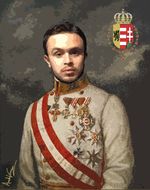
On 7 August 2020, an agreement between the Empire of Karnia-Ruthenia and the North American Confederation, with the consent of the Grand Republic of Delvera has been completed to set the nation on a brand new course. That day, at 3:00pm, Emperor William I signed the "Act of Abdication and Viceroyalty"[15] formally relinquishing his position as North American Emperor and Senior King in the Confederation. He has named Oscar of Karnia-Ruthenia as his successor to both positions. Emperor Oscar has agreed to the arrangement and it was hoped that this change would enable stronger ties between the NAC and Delvera and the Empire of Karnia-Ruthenia. Emperor William continued to serve the nation in the private sector and within the Council of Junkers.

In addition, the position of Viceroy of the Confederation has been established to allow a more localized rule of law. the Viceroy shall serve as the Senior Crown's formal functionary in day-to-day operations of that office, working alongside the Junior Crown. Dylan Callahan, who has recently become a citizen of the North American Confederation has been appointed to the position. King Joseph I, Junior King in the Confederation, has expressed his hope that this will usher in a new era of activity and revitalized economic prosperity for the North American Confederation.
Following the ascension of Oscar I to the throne of the North American Confederation, the Council of Junkers has been hard at work developing a new system of government for the nation that can better represent its interests. Given the unique opportunity the abdication of Emperor William I has provided the North American micronational community to forge a new identity for itself, Emperor Oscar I, in agreement with Viceroy Callahan and King Joseph I have worked with the Council of Junkers to create a fourth constitution. This constitution, also called the Oscarine Constitution,[16] was ratified on the 1 October 2020 and sees the North American Confederation reorganized into a new nation, a descendant of the micronational legacy of nearly a dozen micronations forged into a single collective identity for the previous 13 years.
The North American Confederation, with the permission and understanding of its people, has reorganized itself into the Occidian Empire.[17] The Imperial Forces of Defense, the Council of Junkers were reorganized and the capital was transferred from Imperial Residence to Greenedge.[18] Through the Ius Doni citizenship program, approved on late 2020, by the first trimester of the following year, the registry of citizens announced an increase of 28.5% of the population.
When the Occidian Monarchy was bounded to Karnia-Ruthenia by personal union by August 2020, the links between Karno-Ruthenian monarchy and the Grand Republic of Delvera developed. Many Delveran citizens became Karno-Ruthenians and soon, common policies were established and the approach of the parts soon created space for negotiations for the union of the three micronations. Although not confirmed, the Treaty of Saint Theotonius signed with Eminia that merged them to the Empire may have influenced the talks to merge of the parties. Another aspect that influenced the Karno-Ruthenian government was the loss of Carpathia and Letzembourg on August 2021. By December, Delvera[19][20][21] and Eminia[22] joined the Empire. Technically, when Delvera joined the Empire, the union between Delvera and Occidia was dissolved, and was than united to Karnia-Ruthenia.
National colors and symbols
-
Flag
(2020) -
Coat of Arms
(2020) -
Midlle coat of arms
(2020-) -
Small coat of arms
(2021-)
Politics
To advise and assist the Occidian Emperor and the Kings in the Empire, in the performing of their Imperium, the monarchs shall have the right to establish an Imperial Cabinet, consisting of qualified individuals to serve as Ministers and assist in the functions designated by their positions. Ministers, once selected by both Kings in the Empire, shall hold their positions in the cabinet until their dismissal by the Kings in the Empire or a formal resignation. Any individual may serve as a Minister, irrespective of their citizenship status.
The Council of Junkers, that deliberate as the supreme legislative and judicial body, is formed by every household recognized and organized by the Imperial government, that shall select for themselves a representative and head of household, who shall be granted the title of Junker and no citizen may be forbidden from serving as a Junker due to age, ethnicity, race, gender identity, economic status, sexual or religious affiliation. Junkers serve for life or until they retire, at which point the households policy on succession shall take effect. The Kings in the Empire shall appoint a Head of the Council of Junkers and be responsible for keeping Council meetings organized.
Head of State
The Occidian Emperor is the Head of State and symbol of the State’s unity and sovereignty. His powers, delimited by the Constitution, are among other, the prerogative to exercise maximum authority in matters concerning the State, be the Supreme Commander of the Imperial Forces of Defense, as Field Marshal, declare war and make peace, with the consent of the Council of Junkers and lead the country's foreign policy and represent it internationally, ratify international treaties and conventions, declare State of Exception and dissolve the Council of Junkers in cases of serious national security risk, as well as dissolve the legislature and convene it for the new legislative year, convene Sessions of the Council of Junkers and advise and be advised by the Council of Junkers, promulgate or veto laws passed by the Council of Junkers, except those amending the Constitution, propose bills, exercise the right of clemency and moderate the actions of the Kings in the Empire.[23]
The Emperor arbitrate and moderate the regular functioning of the Council of Junkers, and exercise the functions expressly conferred on them by the Constitution and the laws. The Emperor, only possessor of Imperium, delegates the power to create and enforce laws to the Kings in the Empire, in a totally particular view on Imperium that should not be confused by the theory brought by the Treaty of Theodosia and the subsequent Treaty of Osokorky. The Sovereign is also the fons honorum of the Monarchy, and he is the only one who may confer civil and military honors, decorations, medals and titles of nobility. His consort may not assume any constitutional functions, except in accordance with the provisions for a regency or the express consent of the Council of Junkers.
Head of Goverment
The Headship of Government is devided by the Kings in the Empire, two co-equal Crowns, who will serve concurrently as Heads of Government. This hereditary office, despite variations in rank and title, will always be politically equal to the other and possess the right of veto upon the other. This office is the renovation made by the last constitution,[24] that revoked the designations of Senior King and Junior King within the North American Confederation[25]..
The Kings in the Empire shall possess the Imperium bestowed by the Emperor, the power to create and enforce laws, as a mandate. When both monarchs are holding Imperium, all laws and actions must be supported and passed unanimously, with imperial assent. A King in the Empire shall be allowed to request a review of their counterpart monarch before the Council of Junkers, to answer for their actions taken during the period of sole rule. Among other prerogatives, Kings in the Empire are allowed to issue decrees approved by the Government, confer civil and military positions, and distinctions in conformity with the law, appoint and dismiss members of the Government, exercise the right of clemency in accordance with provincial law, which may not authorize general pardons, appoint Justices to the courts of the Empire, with the approval of the Council of Junkers, lay and collect taxes, duties, imposts and excises, to pay the debts and provide for the common defence and general welfare of Occidia, regulate commerce with other provinces and territories of the Grand Republic of Delvera, raise and support an Imperial Forces of Defense and many others.
Law
Most of legal initiative lies with the Council of Junkers, that is the legislative and judicial body of Occidia and have among their powers the one to determine the constitutionality of all legislation passed by the Kings in the Empire, the diarchy that exercise the Headship of Goverment. The Kings in the Empire have the power to create and enforce laws with imperial assent. The Occidian Emperor, in turn, may propose bills, promulgate or veto laws passed by the Council of Junkers, except those amending the Constitution.
Internal Affairs
During the Oscarine Era, Joseph Marx remained as the long-ruling strong head of government in the same way he was during the Wilhelmine Era, but he shared his powers with Dylan Callahan in the newly-created position of Kings in the Empire. For the establishment of Occidia, several reforms were prepared, as the reform of the military and of economy, integrating Karnia-Ruthenia into the Delveran system. Also, the new government wanted to boost activity, making Occidia not only relevant within the North American Sector of micronationalism, but also a regional-power backed by Karnia-Ruthenia and Delvera, major powers in the Americas.
Foreign Affairs
Occidia have its foreign affairs conducted by the Grand Republic of Delvera, although also limited by the Treaty of Theodosia, signed during the last days of the North American Confederation but still in force. For this reason, Occidia doesn't usually engage in bilateral relations or in alliances with other micronations, being an exception to this Karnia-Ruthenia due the personal union established on 2020.
Military

The Imperial Forces of Defense consists of those military organizations and units that are, under the laws of the Occidian Empire and Grand Republic of Delvera and the regulations promulgated under them, organized for the aid and defense of the state and its citizenry in times of emergency or imminent danger of an emergency, to provide aid and to stand as a relief force during disasters, and to provide security and protection for the government of the Occidian Empire.[26]
In case of an emergency or imminent danger of an emergency, the Emperor, as Commander-in-Chief, may supplement the volunteer forces of the Imperial Forces of Defense, not inconsistent with the laws of the Grand Republic of Delvera, as the exigencies of the occasion requires. Any organization or conscription may be made either pursuant to, or in advance of, any call or order made by the Supreme Commander of the Delveran Armed Services.
It was later formally absorbed by the Armed Forces of Karnia-Ruthenia, but in reality, the Occidian milutary institution altered completely the Karno-Ruthenian institution.
Geography

The territorial claims of Occidia is defined as the collection of all land owned or resided upon by the households of the Empire, and shall change relative to the most recent census accordingly. Other important aspect is the Sphere of Influence that, as defined by the Delveran Constitution, shall be determined by a vote of the Council of Junkers, initiated by the Sovereign only, to be sent to the Imperial government for confirmation or amendment.
Occidia is surrounded by the United States on all sides. Previous land claims had the Empire additionally bordering the Grand Republic of Delvera, and the Kingdom of Callaway, with the Ohio and Missouri rivers collectively forming the largest portions of the Southern and Eastern border between the two nations. Oahu Colony, being one of the islands in the Hawaiian Island chain, was located within the Pacific Ocean. Since the adoption of the third constitution, the State had only laid claim to the lands and properties directly owned by either the citizens or the government directly. The territories of the Empire, in accordance with the Constitution, was comprised almost exclusively of urban dwellings. The largest population is in the area around the city of Dayton, Ohio.
Constituent states
| Flag | Coat of arms | State | State code |
Capital | Citizens | Area (km2) | Official language(s) | Head of state |
|---|---|---|---|---|---|---|---|---|

|
Illinois |
ILL | Chicago[27] | English | King Wilhelm | |||

|
Greene |
GRN | Greenedge | English | Grand Duke Joseph |
Sphere of Influence
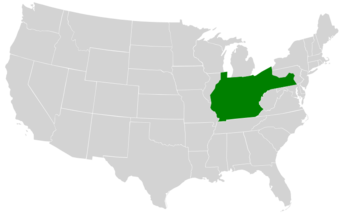
The Sphere of Influence for Occidia, the same formally assigned to the North American Confederation in February 2019 established the western border is determined by the Mississippi, Illinois, and Fox Rivers; following all three from the Kentucky-Tennessee borders easternmost interaction with the Mississippi to the Wisconsin border. The northern border is determined by the Wisconsin-Illinois border to the Michigan border, which turns south to the Michigan-Indiana border and the Michigan-Ohio border before running into the Canadian border and the Pennsylvania-New York-Canadian border.
The eastern border follows the Pennsylvania-New York border south until it runs into the French Creek. The border then follows the French Creek until it meets the Allegheny, then follows the Allegheny River and the Mahoning Creek to its source. The claim then heads east from the source until it runs into the Susquehanna River which it follows until it reaches the Pennsylvania-Maryland border. The southern border heads west along the Pennsylvania-Maryland border until it reaches the Ohio River, cutting straight through the northernmost part of West Virginia. The border then follows the Ohio River south along the Ohio-West Virginia border, then the Kentucky-Virginia border before turning west at the Kentucky-Tennessee border.
Economy

Upon the foundation of the North American Confederation, efforts were taken to establish a national currency and economic presence. This first currency, the Amero, collapsed alongside the first government. Upon reconstruction, financial efforts by the Marx Cabinets were initially fairly minimal, with a greater focus on reestablishing political and diplomatic stability in the region.
As a province of the Grand Republic of Delvera, Occidia utilizes their national currency, the Curo, for all its micronational transaction and businesses. Occidia also currently holds the headquarters for the Imperial Bank of Occidia, the largest financial institution in Delvera, and has begun taking steps to establish a tourism and national souvenir retailer.
Culture
Language
The English is the official language in Occidia and spoken by all of its citizens, being also the second language of the minority with foreign origin. Portuguese is the second main language, spoken by the minority of subjects concentrated in Persenburg, while German also have some fluency proved by some citizens.
Religion
Although Occidia never had an official religion, it may be considered a Christian country, since Christian feast days are celebrated as public holidays, Christian symbols widely used and most of Occidians profess Christian Faith. However, freedom to choose and practice, and don't be judged by their choice of beliefs is guaranteed by the Bill of Rights since 2015 during the Wilhelmine Era and kept during the Oscarine Era.
Cuisine

Occidia's cuisine is generally similar to traditional U.S. southern cooking, although in some areas it can blend elements of both the South and Midwest. One very popular dish is called the Hot Brown, a dish normally layered in this order: toasted bread, turkey, bacon, tomatoes and topped with mornay sauce. Within its area, the Old Fashioned cocktail was created and they have its own style of barbecue.
In fact, drinking is considered a significant part of Occidian culture, being its consumption noted as frequent and moderate. Factors such as cultural identification with the heritage of German immigration, the long-standing presence of major breweries in the area and a cold climate are often associated with the prevalence of drinking.
Within Occidian borders, several companies work in the manufacture of pretzels and potato chips. The chocolate industry is centered in Hershey, Pennsylvania, with other smaller manufacturers nearby. Traditional Dutch-origin foods include chicken potpie, ham potpie, schnitz un knepp (dried apples, ham, and dumplings), fasnachts (raised doughnuts), scrapple, pretzels, bologna, chow-chow, cheesesteaks, hoagie, soft pretzels, Italian water ice, Irish potato candy, scrapple, Tastykake, and strombolis.
National holidays
The national holidays are of paramount importance in order to inspire the Occidian people to celebrate their unique and extremely rich culture and exist holidays with fixed and with varying dates. National holidays were regulated by some specific laws.
| Name | Date | Notes |
|---|---|---|
| New Year's Day | 1 January | The first day of the Gregorian year. |
| Emperor Norton Day | 8 January | Celebrating the life and achievements of Joshua Abraham Norton, Emperor of the United States, one of the spiritual founders of American micronationalism. |
| International Women's Day | 8 March | Celebration of respect, appreciation, and love towards women. |
| Delveran Day | 12 March | Celebration of the Admission of the North American Confederation into the Grand Republic of Delvera. |
| Easter Day | Between 22 March and 25 April | Celebrates the resurrection of Jesus. |
| International Workers' Day | 1 May | Honors the the contributions that workers have made to the strength, prosperity, and well-being of the country. |
| Corpus Christi | Between 21 May and 24 June | Solemnity which honors the Body of Christ. |
| Redonda Day | 21 July | Celebrating the creation and existence of the earliest known North American micronation, the Kingdom of Redonda. |
| Monarchy Day | 7 August | Ascension of Oscar I to the Imperial Throne. |
| Emperor's Day | 14 August | Anniversary of His Imperial Majesty, the Emperor. |
| All Saints’ Day | 1 November | In honour of all the saints, known and unknown; Roman Catholicism. |
| All Souls’ Day | 2 November | Commemorates the faithful departed. |
| Armistice Day | 11 November | Commemoration of the armistice signed between the Allies of World War I and Germany and also in commemoration of both living and dead soldiers who served in any conflict. |
| Unification Day | 28 November | Commemoration of the founding and independence of the North American Confederation. |
| Liberation Day | 1 December | Commemoration of the conclusion of the New European Civil War and honoring all those who fight for micronational peace. |
| Christmas Day | 25 December | Traditional commemoration of the birth of Jesus. |
| New Year's Eve | 31 December | The final day of the Gregorian year; Saint Sylvester's Day. |
See also
External links
References
- ↑ "Act of Abdication and Viceroyalty", by William von Hartmann-Peters, 07 August 2020.
- ↑ PASSAGE OF THE UNIFICATION AGREEMENT, North American Confederation official page, 14 June 2015
- ↑ PASSAGE OF THE MISSOURI COMPACT AND PROCLAMATION AND APPOINTMENT OF FINANCE MINISTER, North American Confederation official page, 02 November 2015
- ↑ KINGDOM OF ACRIN ADMITTED INTO THE CONFEDERATION AS THIRD STATE, North American Confederation official page, 10 May 2016.
- ↑ RATIFICATION OF THE CONSTITUTION COMPLETED AS DELVERAN INTEGRATION LOOMS, North American Confederation official page, 26 June 2018.
- ↑ PRIME MINISTER DELIVERS "LETTER OF INTENT" TO DELVERAN GOVERNMENT, North American Confederation official page, 28 June 2018.
- ↑ Delveran Integration Amendment, North American Senate, 26 July 2018.
- ↑ THE NAC BECOMES A DELVERAN PROVINCE!, North American Confederation official page, 28 July 2018.
- ↑ THE DELVERAN INTEGRATION AMENDMENT PASSES AS PROVINCE VOTE LOOMS, North American Confederation official page, 28 July 2018.
- ↑ OCTOBER SESSION OF SENATE CONCLUDES, North American Confederation official page, 12 October 2018.
- ↑ 2ND SESSION OF SENATE CONCLUDES WITH IMMIGRATION REFORM & TOURISM LEGISLATION, North American Confederation official page, 16 November 2018.
- ↑ 3RD SESSION SEES "NATIONAL HONORS AND PEERAGE ACT" AND 2019 NATIONAL RESOLUTION, North American Confederation official page, 05 January 2019.
- ↑ THE "CHRISTMAS CONSTITUTION" HAS BEEN RELEASED, North American Confederation official page, 19 December 2019.
- ↑ THE "CHRISTMAS CONSTITUTION" GOES INTO EFFECT AS REV. MARX IS CROWNED THE JUNIOR KING, North American Confederation official page, 25 December 2019.
- ↑ "Act of Abdication and Viceroyalty", by William von Hartmann-Peters, 07 August 2020.
- ↑ "THE OSCARINE CONSTITUTION SEES THE NORTH AMERICAN CONFEDERATION REORGANIZED INTO THE OCCIDIAN EMPIRE.", Government Press Office, 30 September 2020.
- ↑ "Emperor Oscar I takes the Head of another micronation in America", Aigues Morning, 14 October 2020.
- ↑ Occidian Law, official website of the Occidian Empire, 21 March 2021.
- ↑ Application of the State of Delvera to merge with the Karno-Ruthenian Empire, Consular Government of Delvera, 10 December 2021.
- ↑ Karno-Ruthenian government communiqué on Delvera Petition, 10 December 2021.
- ↑ Imperial Government's answer to Delveran Petition, Office of the Imperial Chancellor to the Imperial Diet, 15 December 2021.
- ↑ Karno-Ruthenian government communiqué on Eminian status within the Empire, 13 December 2021.
- ↑ "Occidian Emperor", official website of Occidia, 06 October 2020.
- ↑ "", "THE "CHRISTMAS CONSTITUTION" GOES INTO EFFECT AS REV. MARX IS CROWNED THE JUNIOR KING", Government Press Office, 25 December 2019.
- ↑ "The Crowns", official website of Occidia, 06 October 2020.
- ↑ "Defense Forces", official website of Occidia, 06 October 2020.
- ↑ Not the whole city, just the personal holdings of the King in Illinois, Prince Hartamnn-Peters. But considering that no city was founded and the kingdom is at a certain point of view a city-state, that in turn claims to be be a kingdom in Illinois, have the capital in Chicago seemed possible.

